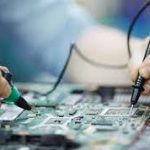Are you interested in a career in the medical and dental instruments industry? This article will provide you with valuable insights to help you navigate your way through this field.
Discover a wide range of job opportunities and the skills and qualifications required for success. Explore the various training and education options available to pursue a career in medical and dental instruments.
Find out about advancement and growth opportunities, as well as the challenges and rewards associated with this industry. Stay up-to-date with the latest trends and innovations, and learn how networking and professional development can benefit your career.
Get ready to succeed in navigating careers in medical and dental instruments!
Job Opportunities in the Medical and Dental Instruments Industry
You’ll be pleased to know that there are numerous job opportunities available in the medical and dental instruments industry. Whether you’re interested in manufacturing, sales, research, or customer support, there is a job for you.
In the manufacturing sector, you could work as a production technician, responsible for assembling and testing medical and dental instruments. Sales representatives are also in high demand, as they play a crucial role in promoting and selling these instruments to healthcare professionals.
If you enjoy research and development, you could work as a product engineer, designing and improving medical and dental instruments. Additionally, customer support positions are available, where you would provide technical assistance and troubleshooting to customers.
With the growing demand for medical and dental instruments, there is no shortage of exciting career opportunities in this industry.
Required Skills and Qualifications for Careers in Medical and Dental Instruments
To excel in these fields, it’s important to possess the necessary skills and qualifications for careers in medical and dental instruments.
As a medical or dental instrument professional, you must have a strong foundation in science and technology. This includes a deep understanding of anatomy, physiology, and medical terminology. In addition, you should be proficient in using various types of medical and dental instruments, such as surgical tools, imaging equipment, and prosthetics.
Strong problem-solving and critical thinking skills are also essential, as you will often be required to troubleshoot and find solutions in high-pressure situations. Effective communication and teamwork are key, as you will be working closely with healthcare professionals and patients.
Lastly, staying updated with the latest advancements in medical and dental technology is crucial to ensure you provide the best possible care and service.
Training and Education Options for Medical and Dental Instrument Careers
One option for obtaining the necessary training and education for a career in medical and dental instruments is through accredited programs at universities or technical schools. These programs offer comprehensive coursework and hands-on training to prepare you for a successful career in this field.
By enrolling in these programs, you can gain a solid foundation in anatomy, physiology, and medical terminology. You will also learn about the different types of medical and dental instruments, their uses, and how to properly maintain and sterilize them.
Additionally, these programs often include practical experiences, such as internships or clinical rotations, where you can apply your knowledge in real-world settings. This will give you valuable exposure to the field and help you develop the necessary skills and confidence to excel in your career as a medical or dental instrument professional.
Advancement and Growth Opportunities in the Medical and Dental Instruments Field
With the right experience and qualifications, you can expand your career opportunities in the medical and dental instruments field. As you gain more expertise and knowledge, you can progress to higher positions and take on more responsibilities.
For example, you may start as a technician or an assistant, but with time and dedication, you can become a supervisor or a manager. Additionally, there are opportunities for specialization within the field. You can focus on a specific area such as surgical instruments, dental equipment, or diagnostic instruments.
This allows you to become an expert in your chosen niche and opens up even more career possibilities. Furthermore, advancements in technology and innovation continually create new roles and positions. By staying updated with the latest trends and developments, you can position yourself for growth and advancement in the medical and dental instruments field.
Challenges and Rewards of Working With Medical and Dental Instruments
The challenges of working in the medical and dental instruments field can be balanced by the rewarding outcomes that come from helping others.
As a professional in this field, you will face various challenges on a daily basis. The constant advancements in technology mean that you need to stay updated with the latest instruments and techniques. Additionally, you may encounter difficult situations where you have to work under pressure and make quick decisions.
However, the rewards of your work are immeasurable. You have the opportunity to make a positive impact on people’s lives by assisting in surgeries, providing dental treatments, and improving overall patient care. The satisfaction that comes from helping someone regain their health and confidence is truly fulfilling.
Despite the challenges, the rewarding outcomes make working in this field worthwhile.
Industry Trends and Innovations in Medical and Dental Instruments
Stay up to date with the latest industry trends and innovations in medical and dental instruments by actively seeking out new information and attending conferences and workshops. By staying informed, you can better navigate your career in this field and remain competitive.
The medical and dental instrument industry is constantly evolving, with new technologies and techniques being developed regularly. Attending conferences and workshops allows you to learn about the latest advancements firsthand and network with experts in the field. It also provides an opportunity to exchange ideas and gain insights from other professionals.
In addition to attending events, actively seeking out new information through online resources, industry publications, and professional networks is crucial. By staying current with industry trends and innovations, you can position yourself as a knowledgeable and valuable professional in the field of medical and dental instruments.
Networking and Professional Development for Medical and Dental Instrument Careers
To excel in your field of medical and dental instrument expertise, actively engage in networking and professional development opportunities. Building a strong network is crucial for career growth. Attend industry events, join professional organizations, and connect with colleagues to expand your contacts and gain valuable insights.
Networking allows you to stay updated on the latest trends and innovations, collaborate with experts, and discover new job opportunities. Additionally, invest in professional development to enhance your skills and knowledge. Attend workshops, conferences, and training programs to stay abreast of advancements in medical and dental instruments.
Continuous learning not only keeps you competitive but also opens doors to promotions and career advancement. Remember, networking and professional development are essential components of a successful and fulfilling career in medical and dental instrument fields.
Tips for Success in Navigating Careers in Medical and Dental Instruments
One way to excel in the field of medical and dental instrument expertise is by actively engaging in networking and professional development opportunities.
By participating in industry conferences, workshops, and seminars, you can stay up to date with the latest advancements and trends in the field.
Networking with professionals in the industry can also open doors to new career opportunities and collaborations.
Additionally, joining professional organizations and associations can provide access to resources, mentorship programs, and job boards specific to the medical and dental instrument field.
Taking advantage of online platforms such as LinkedIn can also help you connect with industry experts and potential employers.
Frequently Asked Questions
What Are the Potential Salary Ranges for Careers in the Medical and Dental Instruments Industry?
What are the potential salary ranges for careers in the medical and dental instruments industry? You can expect a wide range of salaries, depending on factors such as experience, education, and job role.
Are There Any Specific Certifications or Licenses Required for Certain Positions in This Field?
Are there any specific certifications or licenses required for certain positions in this field? Yes, there are. Some positions may require certifications such as the Certified Medical Instrument Technician (CMIT) or licenses like the Registered Dental Assistant (RDA).
How Long Does It Typically Take to Complete the Necessary Education and Training for a Career in Medical and Dental Instruments?
It typically takes a few years to complete the education and training necessary for a career in medical and dental instruments.
What Are Some Common Challenges Faced by Professionals Working With Medical and Dental Instruments, and How Can They Be Overcome?
Some common challenges you may face working with medical and dental instruments include learning new technologies and techniques, dealing with time constraints, and handling stressful situations. These can be overcome through continuous learning, effective time management, and developing coping strategies.
Can You Provide Examples of Recent Industry Trends and Innovations in Medical and Dental Instruments That Professionals Should Be Aware Of?
You should be aware of recent industry trends and innovations in medical and dental instruments. They can include advancements in technology, such as the use of robotics and 3D printing, as well as the development of more precise and efficient instruments.
Conclusion
In conclusion, navigating careers in the medical and dental instruments industry can be both challenging and rewarding.
By acquiring the necessary skills and qualifications, pursuing training and education, and staying updated on industry trends and innovations, you can position yourself for success and advancement.
Networking and professional development opportunities can also help broaden your career prospects.
Remember to embrace the challenges and rewards that come with working in this field, and always strive for continuous growth and improvement.
Good luck on your journey!


